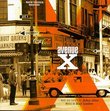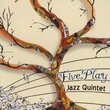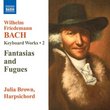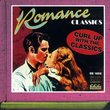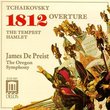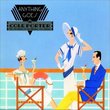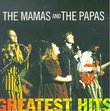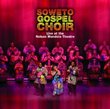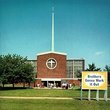| All Artists: Heitor Villa-Lobos, Marlos Nobre, Eleazar de Carvalho, Paraíba Symphony Orchestra, Janos Starker Title: A Brazilian Extravaganza - Heitor Villa-Lobos: Chôros No. 8 / Fantasia for Cello & Orchestra / Uirapuru / Marlos Nobre: Convergências - Janos Starker, Cello Members Wishing: 1 Total Copies: 0 Label: Delos Records Release Date: 12/14/1992 Genres: International Music, Jazz, Special Interest, Pop, Classical Styles: South & Central America, Brazil, By Decade, 1980s, Ballets & Dances, Ballets, Forms & Genres, Concertos, Historical Periods, Modern, 20th, & 21st Century, Instruments, Keyboard, Strings, Symphonies Number of Discs: 1 SwapaCD Credits: 1 UPC: 013491101729 |
Search - Heitor Villa-Lobos, Marlos Nobre, Eleazar de Carvalho :: A Brazilian Extravaganza - Heitor Villa-Lobos: Chôros No. 8 / Fantasia for Cello & Orchestra / Uirapuru / Marlos Nobre: Convergências - Janos Starker, Cello
CD DetailsSimilar CDs
Similarly Requested CDs |
CD ReviewsA great CD of Villa-Lobos and Marlos Nobre's music! Maria Luiza Corker | Brazil | 04/19/2001 (5 out of 5 stars) "This is a very impressive CD with the music of the two greatest genius of the modern Brazilian Music: Villa-Lobos and Marlos Nobre. A very good orchestra, the Paraiba Symphony Orchestra is conducted by the late Eleazar de Carvalho, presenting a excellent sound. The biggest interest of this CD in my opinion, it is due to present the first recording (besides the old EMI recording by the composer himself) of the Choros no. 8 and the Fantasia for cello, and the first recording of "Convergencias" for orchestra by MARLOS NOBRE, a work that presents the best of the orchestral writing of this great Brazilian master. This is, indeed, a most outstanding CD, a genuine gift to the world of music." Sit back and revel Discophage | France | 01/17/2008 (5 out of 5 stars) "This well-filled (66') Delos CD came out in 1989 and presented material that was, even more then than now, pretty rare on CD - although the fledgling Hong Kong /Marco Polo label of Klaus Heymann (not yet of Naxos fame) had published an earlier (1985) recording of Choros # 8, by as improbable an orchestra as the Honk Kong Philharmonic under Kenneth Schermerhorn (Heitor Villa-Lobos: Choros Nos. 8 & 9 - Hong Kong Philharmonic Orchestra / Kenneth Schermerhorn). Now they all can be found in competing versions (there are two others of Uirapuru,Heitor Villa-Lobos: Orchestral Music and Latin American Ballets plus the reissue of Stokowski's historical recording, Villa-Lobos/Prokofiev/Debussy), but still the Fantasia for Cello and Orchestra, in a more coherent coupling with Villa Lobos' two other Cello Concertos performed by Antonio Meneses on Valois, seems difficult to find (Villa-Lobos: Concerto for cello No2; Fantasia). Notwithstanding, this remains a marvelous disc, with superb compositions that come in stupendous sound.
Villa Lobos' reputation is mostly associated with his series of Bachianas Brasileiras, but I find the set of Choros a much more interesting and daring series. Choros # 8 is striking piece. All the hallmarks of Villa Lobos are present - the exotically Brazilian maracas, the drive, the din, the luscious orchestral colors - but they are embedded in a language that is strikingly dissonant, jazzy, powerful, rambunctious. The Fantasia for Cello & Orchestra (1945) would make a fine disc-mate to Bloch's Schelomo. The inspiration here is Brazilian rather than Jewish, but both works inhabit a same stylistic world: lush orchestral colors, sweeping lyricism, from wistful to searing, deep-singing cello, variety of moods. Effervescent and ebullient second movement with more ominously brooding passages. This is a work that deserves a stronger place in the repertoire. Villa Lobos's standing, like Milhaud's, probably suffers from having composed such a vast output of works. But, unlike Milhaud, most of them are great. The Amazonian was an inspiration that accompanied Villa Lobos throughout his compositional career. In the fifties, at the end of his life, he composed a series of striking orchestral tone poems or ballets on that inspiration - Dawn in a Tropical Forest, Genesis, Erosion - The Origins of the Amazon River among them (see my review of the fine Marco Polo disc that collects them, Villa-Lobos: Genesis / Erosao / Amazonas / Dawn in a Tropical Forest). But the ballet Uirapurù (the Musician Wren or Organ Wren of Amazonia), although it didn't get a performance until 1935, is an early piece from 1917 and, along with the tone poem Amazonas from the same year, it is one of Villa Lobos' first orchestral pieces to make an extensive use the folk tunes collected by the composer during his extensive travels through Brazil, and of imitations of the sounds of the Amazonian forest and its fauna. It is a sweepingly romantic and richly orchestrated composition, full of lush colors, in the wake of Ravel's Daphnis but less shimmering and delicate and more brooding and muscular. The somber, tortured romanticism of Suk's Asraël may come to mind, but I find that it is the music of Roussel that Uirapurù comes closest to, his magnificent and neglected Second Symphony in the more brooding and ominous passages, his neo-classical third and fourth symphonies and similar passages in his ballets Spider Feast and Bacchus & Ariane in the more muscular and motoric moments. In the course of its 20 minutes, Uirapurù goes through a variety of moods, from mysterious and subdued to boisterously pounding, and it is full of marvelous touches of mesmerizing colors, such as the hauntingly sensuous and beautiful solo passages for flute (1:52) or saxophone (5:35 - this one memorably jazzy/bluesy), the eerie passages for flute over percussion instruments (including piano) at 7:15, very evocative of a tropical night, the woodwinds imitating the cries of wild animals at 11:05 - and I could go on like this. It was a good idea to give Marlos Nobre's Convergencias from 1968 as a bonus, as it is written in a style that is very much an heir to Villa Lobos' all the way to its use of South American rhythmic motives, yet fully abreast of the contemporary developments in music language. It is a short (8') and impressive orchestral showpiece, dynamic, powerful, of strong dramatic impact, contemporary in its language but still accessible. Contrary to my habit, I haven't done detailed comparisons on these works to try and ascertain the value of the interpretations. For once, I was just happy to sit back and enjoy - better still: revel. And an afterword: since posting this review, I've ordered, listened to and reviewed a 2-CD collection of works by Nobre (Marlos Nobre: Orchestral, Vocal, Chamber Works): highly enjoyable if you like the kind of avant-garde music from the 1960s and '70s best illustrated by Ligeti, Penderecki or Lutoslawski. A post-script from October 2008: finally, I did compare Carvalho's reading of the fabulous Uirapuru with two others, Jan Wagner's with the Odense Symphony Orchestra on Bridge and Stokowski's classic. There are some good and not so good things with Carvalho: passages of great power and sweep and lush orchestral colors, and a stupendous saxophone solo at 5:35, but also, in the section starting at 7:15, with all the bird calls and other mysterious animal cries, and even worse at 10:45, the adoption of tempos so slow as to loose any sense of pent-up menace and feel under valium: the Amazon forest lazily sleeping under a sultry sun, really. I'd hate to be without Carvalho's version for all the good things it offers, but it needs to be complemented with another one, ideally Stokowski's (despite a cut and the loss of the saxophone solo). " |

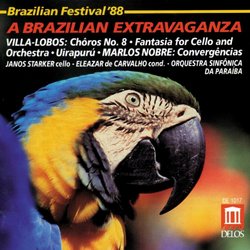
 Track Listings (6) - Disc #1
Track Listings (6) - Disc #1
